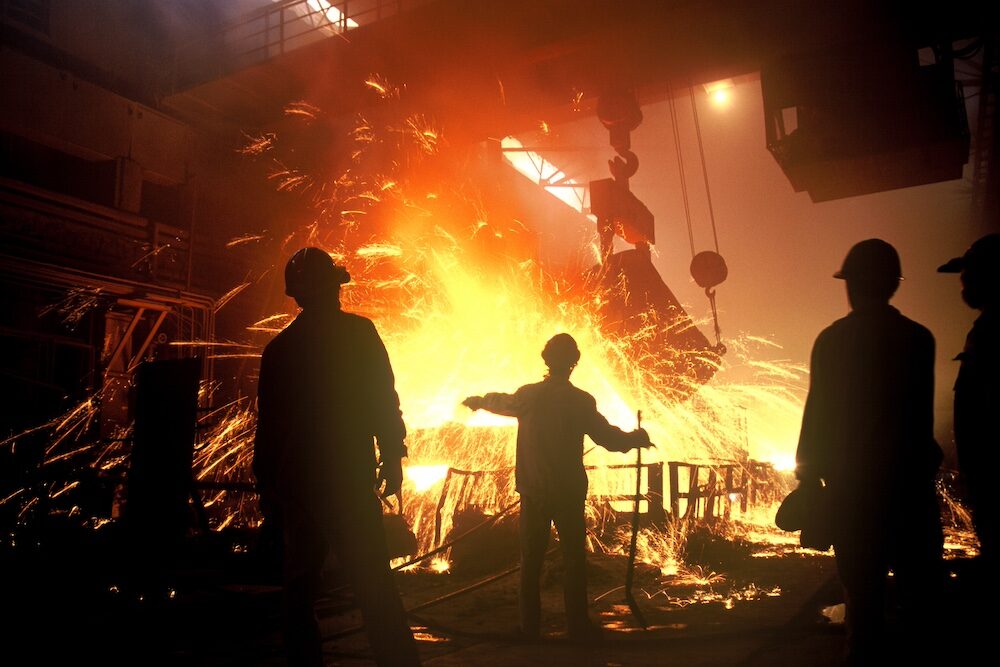
Washington, DC, July 24, 2024 — Today, the Roosevelt Project released a new policy report titled Iron and Steel Decarbonization by 2050: An Opportunity for Workers and Communities. Part of a report series on the U.S. energy transition, this latest report outlines strategic pathways for decarbonizing the iron and steel industry in the United States while ensuring economic and social benefits for workers and communities.
The MIT-Harvard Roosevelt Project, an initiative launched in 2017, aims to address the challenges and opportunities presented by the transition to a low-carbon economy and has been supported by a grant from the Emerson Collective. The steel project is led by a coalition of experts from the Massachusetts Institute of Technology (MIT), Carnegie Mellon University, the labor movement, industry, and community organizations. This latest report represents an important milestone in the project’s mission to balance economic growth, environmental stewardship, and social equity.
Valerie J. Karplus, lead author of the report and a professor at the Department of Engineering and Public Policy of Carnegie Mellon University, emphasized its policy relevance: “Iron and steel production contributes around 7% of global carbon pollution. Decarbonizing the steel industry is not just an environmental imperative, however, but also an economic opportunity. By investing in new technologies and workforce development, we can ensure that American steel remains competitive in a global market while creating good-paying jobs in the communities that need them most.”
David A. Foster, also lead author of the report and a visiting scholar at the MIT Energy Initiative and distinguished associate at the Energy Futures Initiative Foundation, highlighted the collaborative approach adopted by the research team: “This report is the result of extensive engagement with industry stakeholders, labor unions, and community leaders. It provides a roadmap for achieving deep decarbonization in a way that is economically viable and socially just.”
The report identifies key strategies to accelerate deep decarbonization of the iron and steel industry in the United States, including creation of new institutional structures, deployment of tariffs to protect clean U.S. producers from unfair competition and raise revenue for clean technology investments, extending and augmenting public incentive programs and tax credits, and securing early and proactive engagement of workers and other stakeholders in decarbonization planning.
Ernest J. Moniz, former U.S. Secretary of Energy and faculty director of the Roosevelt Project, underscored the broader vision of the initiative: “The Roosevelt Project stands on three pillars—economy, environment, and equity. Our work is informed by historical successes and failures in societal transformation, aiming to help the United States—and others—navigate the changes that will come with evolving energy systems.”
The report’s release comes at a critical time as the U.S. steel industry faces mounting pressure to reduce its carbon footprint while adapting to fierce competition from foreign producers. The strategies and recommendations outlined in the report offer a practical and inclusive approach to achieving deep decarbonization by 2050.
The Roosevelt Project invites policy makers, industry leaders, and community stakeholders to join in the discussion and implementation of the report’s recommendations. For more information, visit the website of the Roosevelt Project at https://ceepr.mit.edu/roosevelt-project.
Roosevelt Project Iron and Steel Case Study Advisory Board:
Chair: Lou Schorsch, retired CEO, ArcelorMittal Americas
Patrick Bloom, VP Government Affairs, Cleveland-Cliffs
Tom Dower, VP Public Policy, LanzaTech
Traci Forrester, EVP Sustainability and Environment, Cleveland-Cliffs
Richard Fruehauf, former Chief Strategy and Sustainability Officer, U. S. Steel
Christian Gianni, Chief Technology Officer, U. S. Steel
Kim Glas, CEO, National Council of Textile Organizations
Amari Jones, Manager, Corporate Sustainability, Nucor Corporation
Dave McCall, International President, United Steelworkers
P. Chris Pistorius, Professor, Carnegie Mellon University
Eugene Pretorius, Manager, Steelmaking Technology, Nucor Corporation
Mike Williams, Senior Fellow, Center for American Progress
Conrad Winkler, President, North Star Bluescope North America
Media Inquiries:
MIT Energy Initiative
Email: miteimedia@mit.edu
Telephone: (617) 258-8891